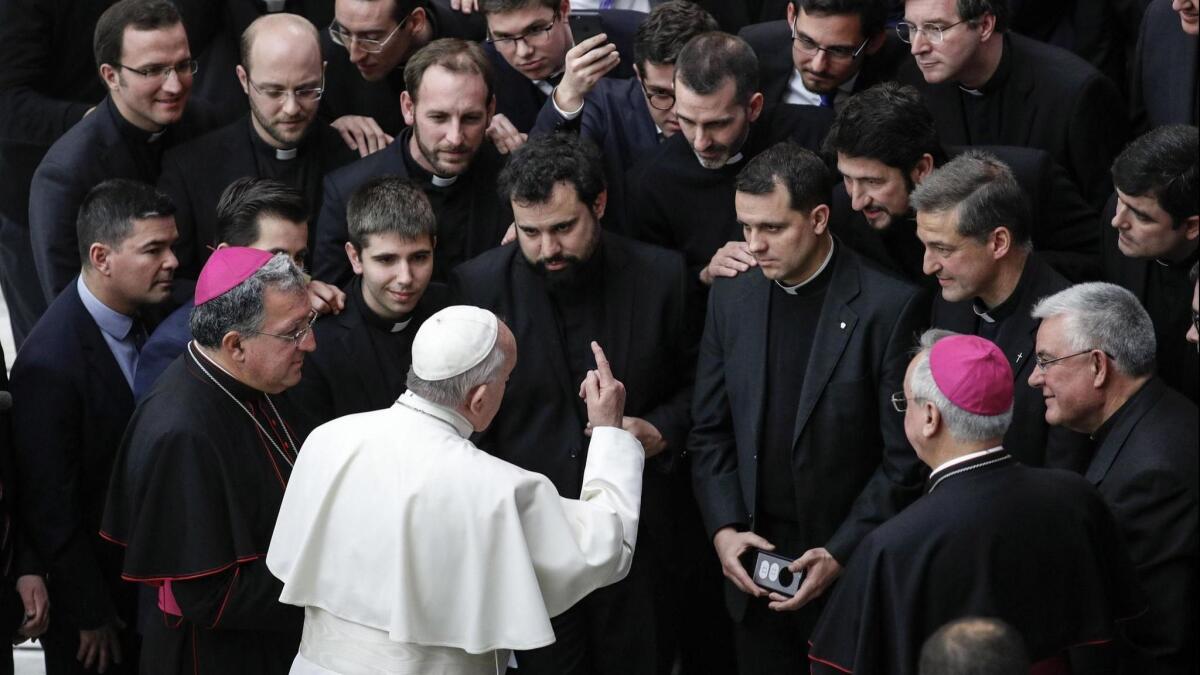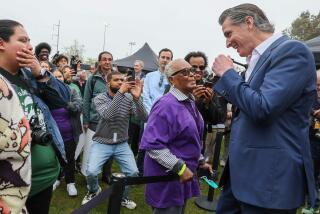Editorial: The Catholic Church finally begins to own up to its #MeToo reckoning

- Share via
On Thursday, Pope Francis will convene a long-awaited meeting of Catholic bishops and other church leaders to frame a global response to the abuse by clergy of “minors and vulnerable adults.” The Vatican considered this so-called summit meeting so important that it asked the U.S. Conference of Catholic Bishops last year not to act on new measures to hold bishops accountable for covering up for abusive priests until after the meeting took place.
It’s scandalous that the Vatican is convening this meeting only now, after decades of revelations of abuse by priests of children and others, and delay and denial by church leaders (including the current pope, who has apologized after defending a Chilean bishop accused of covering up abuse). If this four-day meeting is to be judged a success, the pope must make it clear to participants that if they won’t deal decisively and transparently with predatory priests — and complicit superiors — in their home countries, Rome will do it for them.
That message needs to be sent not only in connection with the abuse of children and adolescents by clergy, an evil that the church has been grappling with for decades, but also with a scandal that has attracted attention more recently: the sexual exploitation of adults, including seminarians and nuns, by powerful clerics. It’s increasingly clear that abuse of minors is only one dimension of the crisis.
It’s increasingly clear that abuse of minors is only one dimension of the crisis.
Unfortunately, clerics involved in preparations for the summit have suggested that its focus will be primarily or even exclusively on sexual abuse of minors. Cardinal Blase Cupich, the archbishop of Chicago, said that although the sexual abuse of adults must be addressed, the summit should focus on young victims because “minors don’t have a voice.”
But limiting the discussion to the abuse of children would be a mistake — the church needs to address on all forms of sexual misconduct by the clergy, and do it soon.
That reality is underlined by the Vatican’s announcement last week that it had defrocked Theodore McCarrick, the 88-year-old former archbishop of Washington, D.C., who had been accused of molesting a teenager decades ago while serving as a priest in New York. (McCarrick said he had no recollection of the abuse and believed he was innocent.) That revelation quickly led to McCarrick’s resignation from the College of Cardinals. But it then emerged that the prelate also had been accused of sexually harassing young seminarians, contriving to have them share his bed. Two New Jersey dioceses secretly paid settlements to men who said they had been preyed upon by McCarrick.
McCarrick’s behavior with seminarians figured in a sensational document published last summer by Archbishop Carlo Maria Vigano, a retired Vatican diplomat who accused Francis of rehabilitating McCarrick after Pope Benedict XVI had supposedly imposed “sanctions” on the American prelate. Vigano’s screed floated a conspiracy theory about a “homosexual current” in the Vatican, and it may have been unfair to Francis. But his description of McCarrick as a “serial predator” seems to have been confirmed by the Vatican’s decision to defrock him.
Seminarians aren’t the only “vulnerable adults” the church must protect from predatory clerics. Francis recently acknowledged that some priests and bishops have been guilty of sexually abusing nuns, and he told reporters that the church has been “working on” the problem. The Catholic community in India has been shaken by charges that a bishop repeatedly raped a nun, an allegation the bishop denies.
Enter the Fray: First takes on the news of the minute »
The abuse of nuns and former nuns by clergy was so outrageous at one French religious order that Benedict disbanded it. Francis went so far as to suggest the nuns had been manipulated into “sexual slavery” by the founder of the order.
The church obviously must do more to address the abuse of minors, including in the United States. Bishops in this country in 2002 adopted a Charter for the Protection of Children and Young People that, among other reforms, obliges dioceses to report allegations of sexual abuse of a minor to public authorities. Dioceses also have released the names of priests credibly accused of sexual wrongdoing — through not always in timely fashion. Missing, however, has been a systematic commitment to investigating and if necessary removing bishops who turn a blind eye to the sexual abuse of minors by priests. That needs to be rectified.
Yet it’s vital that the church also deal firmly with priests who sexually abuse or exploit “vulnerable adults,” be they young seminarians, nuns or lay men or women who seek a priest’s counsel only to be sexually exploited or attacked. The Catholic Church is now facing its own #MeToo moment, and it needs to respond forcefully.
Follow the Opinion section on Twitter @latimesopinionand Facebook
More to Read
A cure for the common opinion
Get thought-provoking perspectives with our weekly newsletter.
You may occasionally receive promotional content from the Los Angeles Times.










